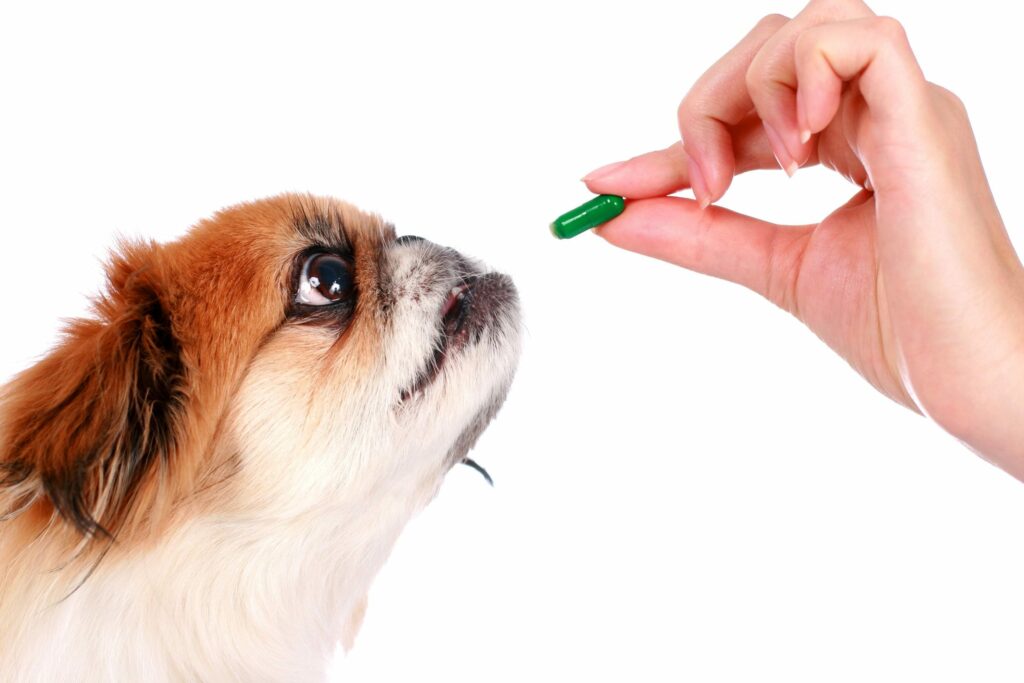Deciding whether to give your dog multivitamins should be done in consultation with a veterinarian who has knowledge of your dog’s specific health needs. While multivitamins can be beneficial for some dogs- Dog Multivitamins, it’s important to understand that most well-balanced dog diets already contain the necessary vitamins and minerals.
In this blog post, we’ll discuss what multivitamins are and why dogs might want them; Dog Multivitamins. We’ll also explain why not all dogs may want multivitamins, and help you decide if they’re right for your pup. Finally, if you’ve decided to give your dog multivitamins, we’ll share some tips to help you choose safe, pet-friendly products.
Table of Contents
What Are Dog Multivitamins?
Multivitamins are dietary supplements that contain a combination of essential vitamins and minerals. They are designed to provide a convenient way to supplement your diet with nutrients that may be lacking in your regular food intake. These supplements typically come in the form of tablets, capsules, powders, or liquids.
The human body requires a variety of vitamins and minerals to function properly. These nutrients play crucial roles in various bodily processes, such as metabolism, immune function, cell growth, and overall health maintenance. While it is generally best to obtain these nutrients through a balanced diet, multivitamins can be used as a supplement when dietary intake is insufficient.
Multivitamin formulations can vary, but they typically include a combination of vitamins such as vitamin A, C, D, E, K, and various B vitamins (e.g., thiamine, riboflavin, niacin, B6, B12, folate). Additionally, they may contain essential minerals like calcium, iron, magnesium, zinc, selenium, and others.
It’s important to note that multivitamins should not replace a healthy diet. They are intended to complement a balanced eating plan and may be beneficial for individuals with specific nutrient deficiencies, dietary restrictions, or certain medical conditions. It is always advisable to consult with a healthcare professional before starting any new supplements to ensure they are suitable for your individual needs and to determine the appropriate dosage.
When Might My Dog Take Multivitamins?
The decision to give your dog multivitamins should be made in consultation with a veterinarian. While multivitamins can be beneficial in certain situations, such as when a dog has a specific vitamin deficiency or is on a restricted diet, they are not necessary for every dog.
Here are some situations where your veterinarian might recommend giving your dog multivitamins:
- Nutritional Deficiencies: If your dog has been diagnosed with a specific vitamin deficiency, your veterinarian may recommend a targeted vitamin supplement to address that deficiency.
- Poor Diet: If your dog’s diet is inadequate or lacks essential nutrients, a multivitamin may be recommended to fill in the nutritional gaps. However, it’s generally better to focus on providing a balanced and appropriate diet for your dog rather than relying solely on supplements.
- Senior Dogs: Older dogs may have increased nutrient requirements or difficulty absorbing certain vitamins. In such cases, your veterinarian might suggest a multivitamin specifically formulated for senior dogs.
- Specific Health Conditions: Some medical conditions may cause dogs to have increased nutrient needs or difficulty absorbing certain vitamins. In these cases, your veterinarian might recommend a multivitamin to support your dog’s overall health.
It’s important to note that giving excessive amounts of certain vitamins can be harmful to dogs. Vitamins A, D, and certain B vitamins, such as niacin, can be toxic in high doses. Therefore, it is crucial to consult with your veterinarian before starting any multivitamin supplementation for your dog.
Do All Dogs Need Multivitamins?
Not all dogs necessarily need multivitamins. Dogs generally obtain the necessary vitamins and minerals from a balanced and complete diet. Commercially available dog food is formulated to meet the nutritional needs of dogs and should provide all the essential vitamins and minerals they require.
However, there may be certain circumstances where a dog might benefit from additional vitamin supplementation. These situations include:
- Specific deficiencies: If a dog has been diagnosed with a specific vitamin deficiency by a veterinarian, targeted supplementation may be recommended.
- Restricted diets: Dogs on homemade diets or diets that are limited in variety and quality may require additional vitamin supplementation to ensure they receive all the necessary nutrients.
- Health conditions: Some medical conditions, such as malabsorption disorders, digestive issues, or chronic illnesses, can affect a dog’s ability to absorb and utilize nutrients properly. In these cases, a veterinarian may recommend specific vitamins or supplements.
- Growth stages: Puppies and adolescent dogs have higher nutritional requirements due to their rapid growth. In consultation with a veterinarian, it may be necessary to supplement their diet with specific vitamins or minerals during these stages.
It’s important to note that giving dogs excessive amounts of certain vitamins can be harmful. Over-supplementation of certain vitamins, such as vitamin A or vitamin D, can lead to toxicity. Therefore, it’s crucial to consult with a veterinarian before introducing any multivitamins or supplements into your dog’s diet to ensure they are appropriate and safe for your specific dog’s needs.
How Can I Choose Safe, Dog-Friendly Multivitamins?
When choosing safe and dog-friendly multivitamins for your pet, it’s important to consider a few key factors. Here are some guidelines to help you make an informed decision:
- Consult Your Veterinarian: Before adding any supplements to your dog’s diet, it’s crucial to consult with your veterinarian. They can assess your dog’s specific needs, health conditions, and provide recommendations based on their individual requirements.
- Look for Dog-Specific Formulas: Avoid giving your dog human multivitamins as they may contain ingredients that can be harmful to dogs. Instead, choose a multivitamin specifically formulated for dogs. These products are designed to meet the nutritional needs of dogs and typically come in appropriate doses.
- Quality and Safety: Look for reputable brands that have a good track record and adhere to high manufacturing standards. Check if the product is tested for safety, quality, and efficacy by a third-party organization, such as the National Animal Supplement Council (NASC) in the United States.
- Essential Nutrients: Ensure that the multivitamin provides essential nutrients that dogs need. These may include vitamins (A, B complex, C, D, E, and K), minerals (calcium, phosphorus, zinc, selenium), and omega-3 fatty acids. However, remember that excessive amounts of certain nutrients can be harmful, so follow the recommended dosage.
- Allergies and Sensitivities: If your dog has known allergies or sensitivities, carefully review the ingredient list of the multivitamin to avoid potential triggers. Common allergens in dog supplements may include soy, dairy, and artificial flavors or colors.
- Dosage Form and Administration: Consider the dosage form that works best for your dog. Multivitamins can come in various forms such as tablets, chewables, or liquids. Choose a form that your dog will readily accept. Additionally, follow the recommended administration instructions provided by the manufacturer.
- Age and Size Appropriateness: Take into account your dog’s age and size when selecting a multivitamin. Puppies, adult dogs, and senior dogs may have different nutritional requirements. Furthermore, large breed dogs may need different dosages compared to smaller breeds.
- Monitor for Effects: Once you start giving your dog a multivitamin, monitor their response and any changes in behavior or health. If you notice any adverse effects or concerns, discontinue use and consult your veterinarian.
What Kind of Multivitamin is Right For my Dog?
When it comes to selecting a multivitamin for your dog- Dog Multivitamins, it’s important to consult with a veterinarian who can provide personalized advice based on your dog’s specific needs. The right multivitamin for your dog will depend on factors such as their age, size, breed, overall health, and any existing medical conditions they may have.
In general, a well-balanced and nutritious diet should provide your dog with all the necessary vitamins and minerals they need. However, in some cases, a multivitamin supplement may be recommended by a veterinarian to address specific deficiencies or support certain health conditions.
If your veterinarian determines that a multivitamin is necessary for your dog, they will likely recommend a product that is specifically formulated for dogs. These multivitamins typically come in different forms such as tablets, chews, or liquids. They are designed to provide the appropriate dosages of vitamins and minerals required by dogs, as some nutrients may be harmful if given in excessive amounts.
When choosing a multivitamin, consider the following:
- Quality: Look for a reputable brand that follows quality manufacturing practices and uses high-quality ingredients.
- Formulation: Ensure that the multivitamin is formulated for dogs and contains the necessary vitamins and minerals. Avoid giving human multivitamins to your dog, as they may contain ingredients that are toxic to dogs.
- Age and size appropriateness: Some multivitamins are formulated specifically for puppies, adult dogs, or senior dogs. Choose a product that corresponds to your dog’s life stage and size.
- Specific needs: If your dog has any specific health concerns, such as joint issues or skin problems, there are multivitamins available that target those conditions. Your veterinarian can guide you in selecting the most appropriate one.
Best Dog Multivitamins
It’s always a good idea to consult with a veterinarian before adding any supplements to your dog’s diet. That being said, here are some popular dog multivitamins that you can consider:
- Zesty Paws Multivitamin for Dogs
- Nutri-Vet Multivitamin Chewables for Dogs
- VetriScience Laboratories Canine Plus Multivitamin
- NaturVet All-in-One Support for Dogs
- Pet Naturals of Vermont Daily Multivitamin for Dogs
Consult with your veterinarian before starting any new supplements for your dog.
READ ALSO:
- 3 Basic Causes of Breathing Difficulties In Dogs, Symptoms And Treatment
- 13 Basic Causes of Fever In Cats, Symptoms And Treatment
- 7 Basic Causes of Vomiting In Cats, Diagnosis And Treatment
Final Thoughts
Giving your dog excessive amounts of certain vitamins can be harmful. Some vitamins; Dog Multivitamins, such as vitamin D, can be toxic if given in excess. Others, like vitamin A, can accumulate in the body and lead to toxicity over time. Therefore, it’s best to consult with a professional to ensure the right dosage and to avoid potential health risks.
Your veterinarian will have the most accurate and up-to-date information on your dog’s health and can make appropriate recommendations regarding multivitamins or any other dietary supplements




